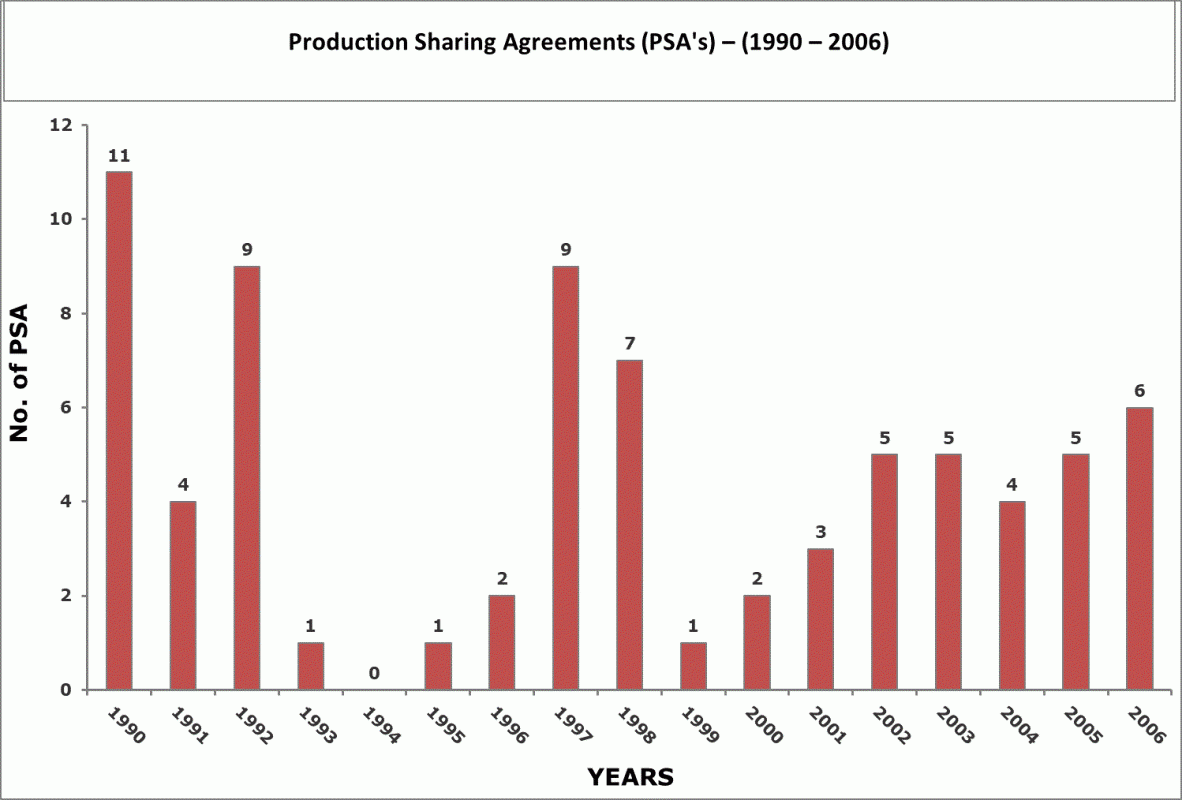SA - Latest Incentives
PSA - Description
PSA's Signed in (1990 - 2006)
SA - Latest Incentives
- Interests of parties protected and Investor risk / reward balanced through improved terms;
- Cost recovery period reduced.
- Exemption from petroleum related revenue/profit taxes and import/export duties (including sub contractors).
- Free disposition of contractor share of production.
- Free transfer of funding and revenue into/out of the country.
- Improve development economics by ensuring any spare capacity in existing infrastructure is made available at reasonable cost, recoverable tariffs.
- Simplify application processes, make data for open blocks more available and assist with field trips etc.
- No restrictions on Contractor performing Petroleum Operations (International Petroleum Industry standards) apply.
PSA - Description
Each PSA becomes a law, with key features;
- State owns its Petroleum Resources and Contractor has title to its Cost Oil and share in Production Sharing Oil.
- Contractor is granted exclusive rights to conduct Petroleum Operations in the Agreement Area by the Ministry (MOM).
- Contractor executes Petroleum Operations at its sole risk and cost.
- Management vested in a Joint Management Committee during exploitation phase (but mainly the Contractor’s responsibility during the exploration phase).
Basic Terms;
- Sliding scale royalty, signature and production bonuses.
- Contractor recovers qualifying costs and shares profit oil with Ministry on a sliding scale.
- Contractor share of production is net of taxes.
Features of Production Sharing Agreements;
- An agreement is the legal frame of reference defining the agreed-upon terms and conditions between both parties─ the MOM and contractor. Such agreement is made through direct negotiation between contractual parties. Both parties should be completely convinced of the agreement’s content, since it, the agreement, is an instrument created by both parties on the basis of their consent. No party has the right to impose any thing on the other party. In addition, a contracting oil company is given sufficient time is to decide whether to enter into agreement or not. This is through first signing a memo of understanding valid for a period of two to three months after both parties have already defined the most significant economic terms and conditions governing oil operations in the area chosen by the contractor. During such a period, both parties start negotiating the sharing agreement. After signing the agreement, they start following the endorsement procedures of the agreement.
- Endorsement of an agreement between the parties is by the issuance of a special law to that effect in accordance with effective constitutional procedures in the Republic of Yemen. Such a law should be approved by concerned bodies (the Council of Ministers, the Parliament and then the President of the Republic). Legally speaking, such an agreement constitutes an operative legal guarantee whose provisions dominate all other regulations and legislations in force at the time of drafting it or those violating its provisions. This legal value of the agreement is so because the agreement is a special law issued on the basis of both parties’ consent. That is, the will of both parties was the basis for drafting such an oil contract (the agreement, which paves the way for both parties to appropriately put it into force later on.
- The production sharing agreement (PSA), described above, is legally the most persuasive and suitable instrument. The flexibility of its provisions has encouraged international oil companies to venture and invest millions of dollars in investment projects in Yemen. The reason is that unlike any other place, in Yemen, investors have great expectations for discovering oil of commercial significance under such flexible legislations instead of working somewhere else under effective legislations whose provisions are usually unclear and unknown to the investors or most of the time new investment decisions are taken as it may have happened in a number of countries which had surpassed us in this field.
What has been jotted down were some of the features governing oil exploration and production agreements in Yemen; other features are those of the international oil industry standards, which are included in Yemen’s agreements. More importantly are the natural characteristics of Yemen, which suit and are a source for safe investment; these are the magnificent climate and the hospitality and generosity of the Yemeni people. Yemenis tend to treat their guests whether a visitor, investor or a resident in a very elegant and civilized manner.
PSA's Signed in (1990 - 2006)

